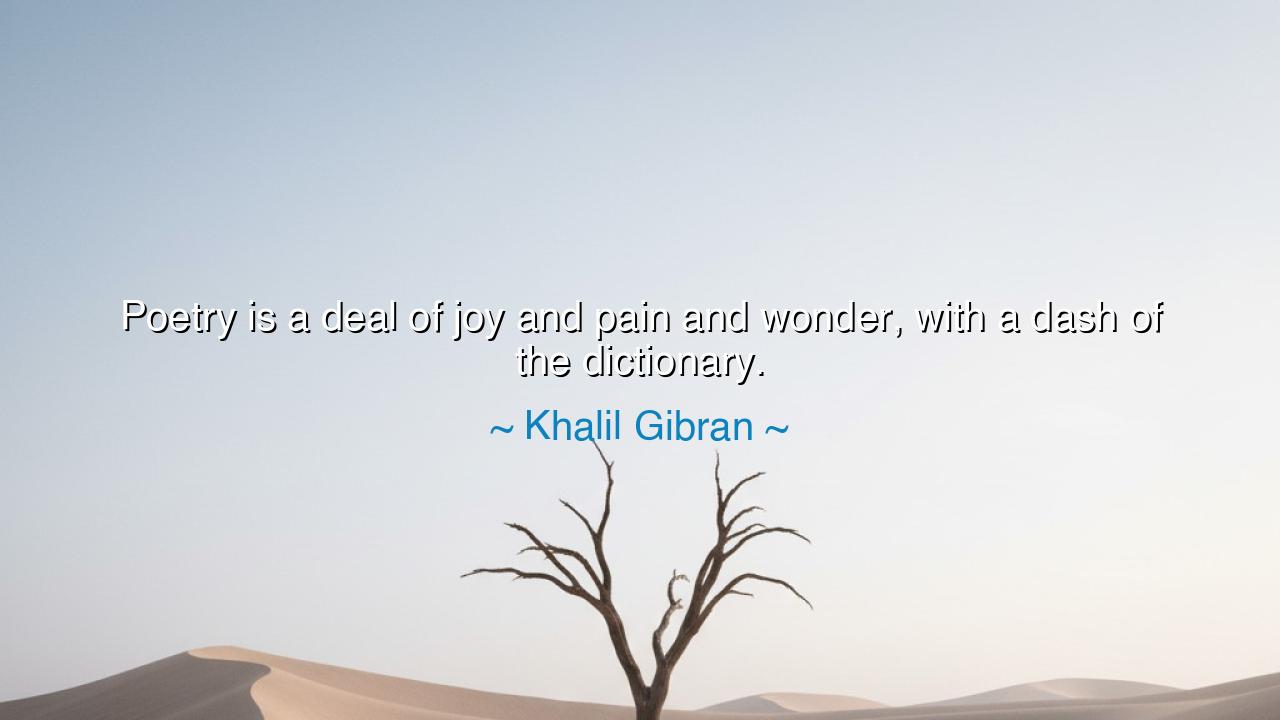
Poetry is a deal of joy and pain and wonder, with a dash of the






“Poetry is a deal of joy and pain and wonder, with a dash of the dictionary.” Thus spoke Khalil Gibran, the sage of Lebanon, whose words were rivers of fire flowing through the valleys of the heart. In this saying, he reveals the true essence of poetry—that it is born not merely from the clever arrangement of words, nor from the sterile craft of grammar, but from the furnace of human experience. It is shaped in the crucible of joy, in the abyss of pain, in the vast silence of wonder—and only at the end, to bind these flames together, comes the humble dictionary, the tool of language.
The poet, therefore, is not first a scholar but a seer. His vision springs not from rules, but from life itself. Joy teaches him the music of laughter, the sweetness of union, the song of morning light upon the fields. Pain gives him depth, for without sorrow no verse can touch the marrow of the soul. And wonder—that childlike gaze upon the stars, upon the face of love, upon the mystery of existence—gives his words their eternal reach. Only then, when heart and spirit are full, does the poet reach into the dictionary to find the exact vessel in which to pour his overflowing truth.
The ancients understood this balance. Think of Sappho, whose fragments still stir the blood of lovers. She did not write from study alone, but from the burning of her heart, from joy of passion and pain of longing. Or Homer, who sang of gods and men with such wonder that even after millennia, his words still thunder. Yet beneath their songs lay also the discipline of craft, the careful choosing of words—the “dash of the dictionary” that gave form to fire. Gibran, in his wisdom, reminds us that without life, poetry is hollow, but without language, passion is formless.
History offers us another example in the life of Maya Angelou. She endured hardship, silence, and unspeakable pain, yet out of that suffering came poems and songs that lifted entire generations. Her words carried the rhythm of joy in resilience, the awe of wonder at human dignity, and yes, the precise weight of language chosen with care. She embodied Gibran’s vision: her poetry was not a scholar’s exercise, but the cry of a soul, sharpened by craft until it pierced hearts across the world.
We must not mistake Gibran’s mention of the dictionary as a dismissal of learning. He does not scorn craft—he honors it. But he places it last, where it belongs. For the dictionary cannot give birth to poems on its own; it can only serve as vessel, as scaffolding, as the delicate frame that holds the greater structure of spirit. The true content of poetry comes first: joy, pain, and wonder, the elements of existence that bind us all. Without these, no arrangement of words, however polished, will live.
The lesson, then, is clear: live deeply, if you would speak deeply. Do not seek poetry first in books, but in your own beating heart, in the laughter and tears of your days, in the astonishment of standing beneath the stars. Let your words rise out of life, and only then polish them with craft. And even if you do not write, let your life itself be a poem, shaped by joy, strengthened by pain, illuminated by wonder, and spoken with the careful words of truth and kindness.
Therefore, children of tomorrow, remember Gibran’s wisdom. The true poet is not the one who knows every word in the lexicon, but the one whose heart has been pierced by the arrows of life and yet still sings. Seek out joy with gratitude, endure pain with courage, embrace wonder with humility, and then clothe it all in the garments of language. For in this way, whether you write or not, your life will become a poem, and its echoes will live beyond the span of your years.






MPTran Thi Mai Phuong
Gibran’s description of poetry as a 'deal of joy and pain and wonder' makes me think about how poetry reflects the complexity of human emotions. Adding a 'dash of the dictionary' seems to ground it, though. Does this imply that poetry is not purely about feeling, but also about mastering language? How can poets avoid getting lost in complex language and stay connected to the raw emotional essence that poetry can communicate?
DNDuyen Ngoc
What I love about Gibran’s quote is how he combines the emotional and intellectual aspects of poetry. Poetry is more than just emotional expression; it’s also about choosing the right words. But how much does the technical side of poetry matter? Does a poem need to have a certain linguistic depth to be effective, or is its emotional impact the most important factor? How do we strike that balance between heart and intellect in writing?
AVAnh vo
Gibran’s idea of poetry is a lovely way to capture its essence, but I wonder—what does the 'dash of the dictionary' really mean? Does it suggest that poetry, while emotionally driven, needs precision in language to truly convey its message? Can poetry be just as powerful when the words are simple, or is there an inherent need for complexity in poetry to express the deeper layers of human experience?
HNHoang Ngan
Khalil Gibran’s view on poetry is both beautiful and insightful. The way he describes poetry as a mixture of joy, pain, and wonder makes it feel like a reflection of life itself. But then, he adds a dash of the dictionary, reminding us that even poetry has a foundation in language and structure. How important is it for poetry to balance raw emotion with intellectual depth? Can poetry be truly effective without this balance?